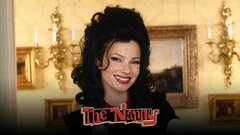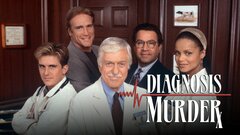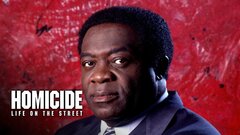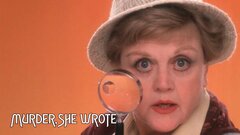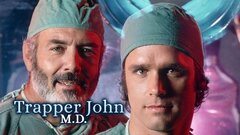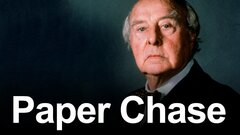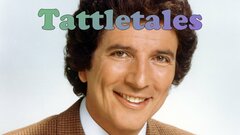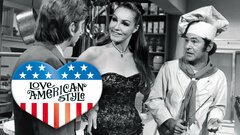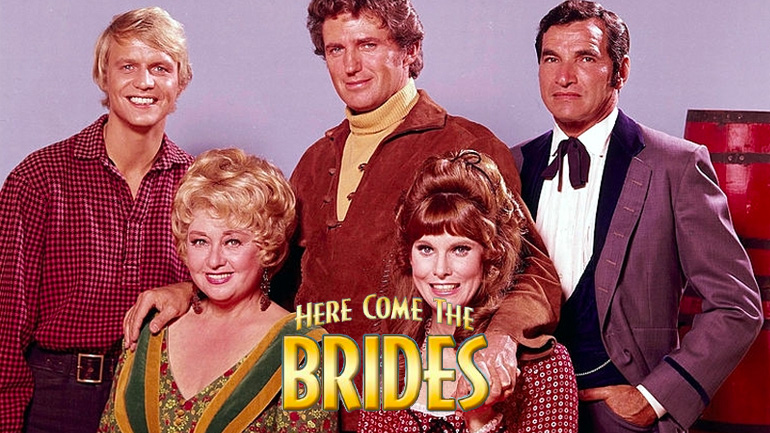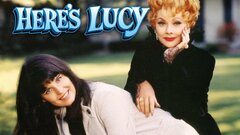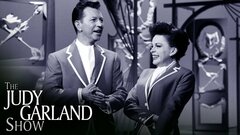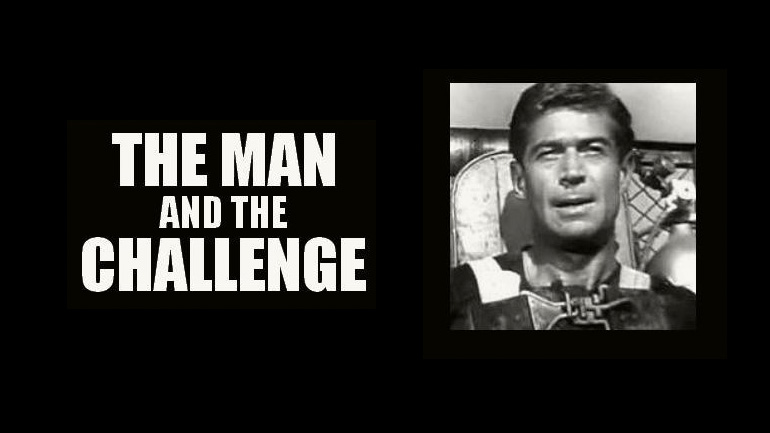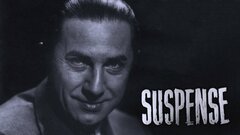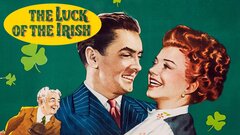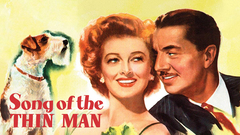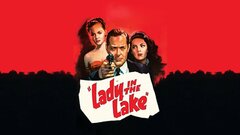Though she preferred to be called Mrs. Steve Allen, Jayne Meadows enjoyed a rich, varied and celebrated career under her own name, quite apart from that of her television pioneer husband and co-star. Born in China at the start of the Chinese Civil War, Meadows and her family escaped to America where she followed her acting dreams to Hollywood. A contract player for MGM after World War II, Meadows rose quickly from supporting such stars as Katharine Hepburn, William Powell and Myrna Loy to playing love scenes with the A-list likes of Tyrone Power in "Luck of the Irish" (1948) and David Niven in "Enchantment" (1948).
In New York in the Fifties, Meadows participated in the industry innovations of live television drama and quiz shows, while also appearing on husband Steve Allen's various comedy revues and acting in both feature films and on episodic television. A three-time Emmy award nominee, recipient of the 1988 America Book Award and winner of a 1991 Living Legend Award from the Women's International Center, the an actress-comedienne-playwright-recording artist combined a starlet's beauty with the sharp mind of an academic, weathering a 60-year career to emerge as one of the last surviving links to the golden ages of both Hollywood and television. Jayne Meadows died at her home in Encino, California, on April 26, 2015, at the age of 95.
Jayne Meadows was born Jane Meadows Cotter on Dec. 12, 1920 in Wu-Chang, China. Her parents, Francis James Meadows Cotter and the former Ida Miller Taylor, a banker's daughter whose great-grandfather had bequeathed Union Square to New York City, were Episcopal missionaries who had established a church in central China in the relative peace between the Xinhai Revolution (1911-1912) and the Chinese Civil War (1927-1949). One of four children, and the oldest daughter, Jane Cotter spent her first seven years speaking Chinese.
With the outbreak of civil war in April 1927, the Cotter family was forced to flee Wu-Chang, crossing the Yangtze River only moments after an unexploded bomb crashed through the roof of their home. Landing in Shanghai, Cotter secreted his family in an unheated warehouse, where Jane Cotter passed an uncelebrated seventh birthday. Passage on a steam ship brought the family to Paris and then to England before they arrived in America. Setting up residence in Providence, RI, near the campus of Brown University, the Reverend Cotter was appointed the first dean of the Cathedral of St. John while Jane and her younger sister, Audrey, were enrolled at the Lincoln School, a Quaker school for girls.
Alienated from the other children in their new neighborhood by language (she had to learn English as a second language) and foreign cultural influences (the Cotter children had spent their first years without access to films or radio), Jane Cotter threw herself into in world of fantasy and play-acting, often cashiering her younger sister into plays that she wrote and produced for her family's amusement. Ida Taylor lavished upon her children a rich education in fairy tales and games, which encouraged in all of her offspring highly-developed powers of deduction and logic, with a dash of whimsy. Another move brought the family to southern Connecticut, where Jane was enrolled in St. Margaret's School, an Episcopal Church school in Waterbury. Upon her graduation, and with family finances precluding a college education, Jane offered her services to a local summer stock company, where she was given lowly chorus roles but developed a reputation as "the redhead with the loud voice." It was at this point in her life that Jane Cotter rechristened herself as Jayne Cotter.
Her summer stock performances attracted the attention of the head of RKO in New York, who offered a studio contract; given that she was only 17, Jayne Cotter turned down the offer in deference to the wishes of her parents. The experience did have an unexpected outcome when RKO recommended the young actress for a role in producer Guthrie McClintic's Broadway comedy "Spring Again," with C. Aubrey Smith (and a young understudy named Kirk Douglas) in 1941. Cotter's work on the stage drew more offers of studio contracts and in 1946 she set off for MGM. Because the studio had actress Audrey Totter in their stable of young actresses, Jayne Cotter was asked to change her surname. She made her film debut as Jayne Meadows in Vincente Minnelli's noir-inflected melodrama "Undercurrent" (1946), for which George Cukor had directed her screen test. In the film, Meadows was cast in an ornamental role as a socialite in support of stars Katharine Hepburn, Robert Mitchum and Robert Taylor. The film was panned by critics but proved a substantial success upon its release.
Meadows was given a shot to do more but again enjoyed limited screen time as a conniving murderess in "The Lady in the Lake" (1947), based on the mystery novel by Raymond Chandler. Directed by star Robert Montgomery with an innovative subjective camera that placed all of the film's events within the perspective of private detective Philip Marlowe, Meadows was outstanding as a cold-blooded killer with a socialite's ditzy veneer. Although she is remembered principally for her later roles in comedies, Meadows appeared in a number of hard-edged crime films or murder mysteries early in her career, among them "Song of the Thin Man" (1947), the sixth and final film in the long-running MGM series starring William Powell and Myrna Loy as husband and wife sleuths. On loan-out to Universal, Meadows appeared as a dentist's nurse who suspects her employer's death means foul play in "The Fat Man" (1951). Directed by William Castle, the whodunit was based on an ABC radio series created by Dashiell Hammett, which was canceled due to the left-leaning writer's controversial testimony before the House on Un-American Activities Committee and subsequent prison sentence for refusing to name names. Hammett's name was left off of the credits for the finished film, which also featured Rock Hudson in an early role.
While promoting 20th Century Fox's Biblical epic "David and Bathsheba" (1951), in which she donned a black wig as the assertive Michal, first wife of Gregory Peck's King of Israel, Meadows was approached about the possibility of acting in the exciting new medium of live television. Interested more in returning to Broadway, Meadows consented to an interview with young director Sidney Lumet and was persuaded to make her television debut in the CBS anthology series, "Danger" (1950-55). While the stage-trained and film-seasoned actress found working live in front of three cameras more than a little daunting, she appeared in a number of live broadcasts over the next few years, on such weekly series as "Robert Montgomery Presents" (NBC, 1950-57), "Kraft Television Theatre" (ABC, 1949-1958) and "Suspense" (CBS, 1949-1954). She returned to Broadway in 1958 in a production of Alec Coppel's comic mystery "The Gazebo," which ran for 266 performances at the Lyceum Theatre.
Meadows' 1954 marriage to comedian and proto-multimedia bon vivant Steve Allen coincided with her involvement in the TV innovation of live quiz shows, beginning with "I've Got a Secret" (CBS, 1952-1967). Her quick wit and estimable powers of deduction (she once guessed the identity of the last surviving witness to the assassination of Abraham Lincoln) made Meadows an in-demand panelist on a host of rival game shows produced by Mark Goodson and Bill Todman for CBS, including "What's My Line?" (1950-1967), "To Tell the Truth" (1956-1968) and the short-lived "The Celebrity Game" (1964-65), hosted by Carl Reiner. She also appeared on 35 episodes of "The Hollywood Squares" (1965-1982). Meadows' appearance as a participant in the second pilot for "Password" (1961-1975) was integral to the series being picked up by ABC. Meadows appeared alongside her husband as a series regular or guest on "The Steve Allen Plymouth Show" (NBC, 1956-1960), "The New Steve Allen Show" (ABC, 1961-65) and "The Steve Allen Playhouse" (1962-64).
In 1960, Meadows was cast in "College Confidential," producer-director Albert Zugsmith's follow-up to "High School Confidential" (1958); her costar had been slated to be David Janssen but Meadows agreed to act in the film only if there were a role for Steve Allen. Critics were cruel to "College Confidential" but unanimous in their affection for the star couple. She would also try her hand at recording with the RCA Victor label, singing as a duo act with sister Audrey, who had also found television fame on the CBS hit "The Jackie Gleason Show" (1952-57) and Gleason's later spin-off, "The Honeymooners" (CBS, 1955-56).
Through the Seventies, Meadows was a frequent face on episodic television, with guest roles on "Here's Lucy" (CBS, 1968-1974), "Adam-12" (NBC, 1968-1975), "The Love Boat" (ABC, 1977-1986) and "Fantasy Island" (ABC, 1977-1984), as well as in a recurring role as Nurse Chambers on "Medical Center" (CBS, 1969-1976). For Steve Allen's "Meeting of the Minds" (PBS, 1977-1981), which employed a talk show format to bring together figures from history and literature, Meadows appeared over the course of 10 episodes as Cleopatra, Margaret Sanger, Marie Antoinette, Florence Nightingale and Catherine the Great. She returned to Broadway in 1978 for a revival of Moss Hart and George S. Kaufman's "Once in a Lifetime" at Circle in the Square and brought her trademark brass to the role of the Queen of Hearts in a TV production of "Alice in Wonderland" (1985), an Irwin Allen production for CBS that co-starred Red Buttons, Donald O'Connor, Sid Caesar, Telly Savalas and Roddy McDowall.
Meadows played Billy Crystal's mother in Ron Underwood's box office hit "City Slickers" (1991) and its sequel "City Slickers II: The Legend for Curly's Gold" (1994). She drew critical raves for her performance in an off-Broadway production of Neil Simon's "Lost in Yonkers" in 1990, which netted her a Dramalogue Award. Between 1987 and 1988, Meadows and Allen appeared on three episodes of the medical TV series "St. Elsewhere" (NBC, 1982-88). From 1989 to 2000, the couple toured the country in A. R. Gurney's "Love Letters" and turned up as themselves in Robert Altman's "The Player" (1992) and Martin Scorsese's "Casino" (1995). With Steve Allen's death in 2000, Meadows retired from performing. Her last feature film role had been as Michelle Pfeiffer's mother in Rob Reiner's "The Story of Us" (1999), though well into her ninth decade she continued to make public appearances and to contribute interviews related to classic film and television. Jayne Meadows died at her home in Encino, California, on April 26, 2015. She was 95.



